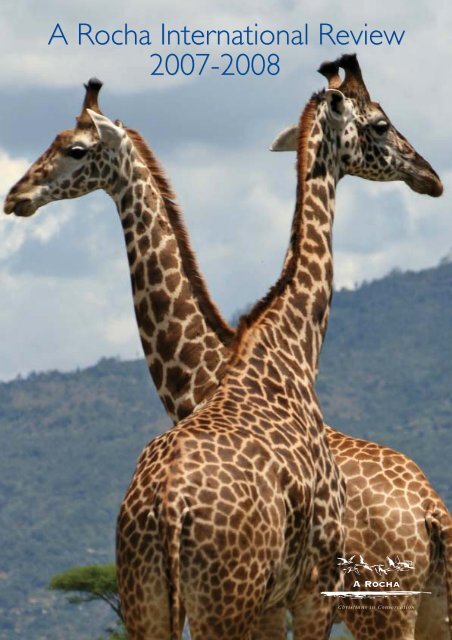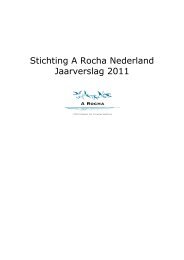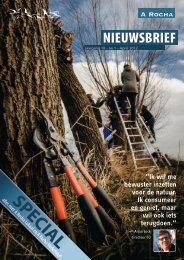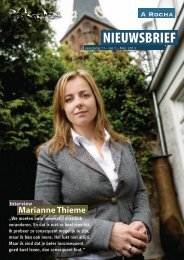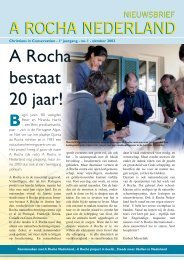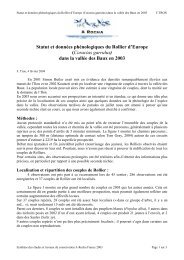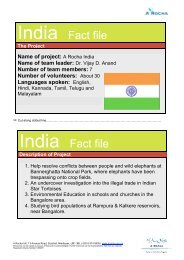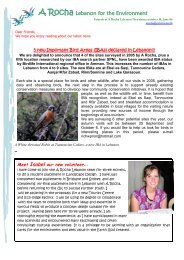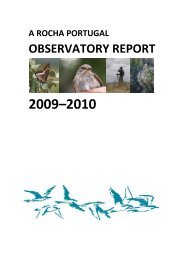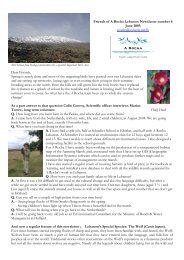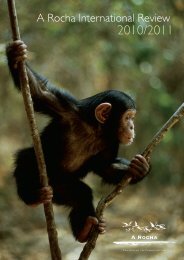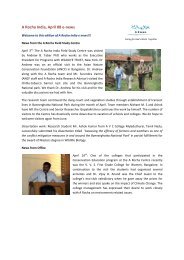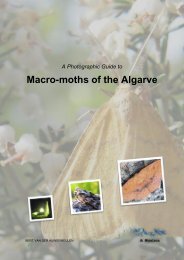2007-2008 International Review - A Rocha
2007-2008 International Review - A Rocha
2007-2008 International Review - A Rocha
Create successful ePaper yourself
Turn your PDF publications into a flip-book with our unique Google optimized e-Paper software.
A <strong>Rocha</strong> <strong>International</strong> <strong>Review</strong><br />
<strong>2007</strong>-<strong>2008</strong>
2<br />
Introducing A <strong>Rocha</strong>...<br />
A <strong>Rocha</strong> is an international<br />
conservation organisation working<br />
to show God’s love for all creation.<br />
A <strong>Rocha</strong>’s five commitments<br />
‘A <strong>Rocha</strong>’ is Portuguese and means ‘The Rock’. This<br />
symbolises our core commitments, expressed in<br />
highly practical ways that vary from project to project:<br />
CHRISTIAN<br />
Underlying all we do is our biblical faith in the living God,<br />
who made the world, loves it and entrusts it to the care<br />
of human society.<br />
CONSERVATION<br />
We carry out research for the conservation and restoration<br />
of the natural world and run environmental education<br />
programs for people of all ages.<br />
COMMUNITY<br />
Through our commitment to God, each other and<br />
the wider creation, we aim to develop good relationships<br />
both within the A <strong>Rocha</strong> family and in our local<br />
communities.<br />
CROSS-CULTURAL<br />
We draw on the insights and skills of people from<br />
diverse cultures, both locally and around the world.<br />
CO-OPERATION<br />
We work in partnership with a wide variety of organisations and<br />
individuals who share our concerns for a sustainable world.<br />
In <strong>2007</strong>, two new national organisations were added – A <strong>Rocha</strong><br />
New Zealand and A <strong>Rocha</strong> Switzerland. A <strong>Rocha</strong> now works in 18<br />
countries: Brazil, Bulgaria, Canada, Czech Republic, Finland,<br />
France, Ghana, India, Kenya, Lebanon, Netherlands, New<br />
Zealand, Peru, Portugal, South Africa, Switzerland, UK and USA.<br />
The group in Kampala, Uganda, was formally recognised by the<br />
<strong>International</strong> Trustees as an Initiative Group, with the hope that<br />
in due course they will become a national organisation.<br />
“The theme of this review is<br />
A <strong>Rocha</strong>’s fifth commitment –<br />
co-operation.<br />
Co-operation means that we partner with others in similar or<br />
complementary work. It means we can tackle bigger projects, share<br />
resources, learn from one another and hold each other accountable.<br />
We achieve far more together than we could in isolation.<br />
Co-operation is important to us because of our Biblical basis. We<br />
follow Jesus Christ, who said he came not to be served, but to serve.<br />
We see partnership as a way to serve others in their work for a<br />
sustainable world, whether or not they share our Christian beliefs.<br />
Most A <strong>Rocha</strong> national teams co-operate with many partners.<br />
Our Editor’s request regarding key partnerships met with a typical<br />
response from Chris Naylor, National Director of A <strong>Rocha</strong><br />
Lebanon: “We work with schools and universities, landowners<br />
and churches, local and national government, as well as funding<br />
organisations and lots of other conservation organisations. Which<br />
would you like to talk about?”<br />
This review can only provide a glimpse of how co-operation runs as<br />
a thread through all we do. We want to take<br />
this opportunity of thanking all those individuals<br />
and organisations who have taught,<br />
encouraged, helped and challenged us during<br />
the last year. We could not do our work<br />
without you, and nor would we want to.”<br />
Marie Connett Porceddu PhD, MBA, became<br />
A <strong>Rocha</strong>’s first CEO in September <strong>2007</strong>. Photo:<br />
Mariano Porceddu
Working with<br />
ABOVE: In the Dakatcha Woodland,<br />
Colin Jackson (A <strong>Rocha</strong> Kenya Director)<br />
and Dominic Mumbu show timber felled<br />
for charcoal to Dr Connett Porceddu,<br />
Peter Harris and other A <strong>Rocha</strong> staff.<br />
Photo: Dan Tay<br />
A <strong>Rocha</strong>’s membership of the European<br />
Habitats Forum is valued as an opportunity<br />
to influence EU decisions which<br />
affect Europe’s landscape and wildlife,<br />
such as White Storks Ciconia ciconia.<br />
Photo: Ken Kay, Avocet Photography<br />
conservation<br />
organisations<br />
A <strong>Rocha</strong> is a nature conservation organisation with a<br />
particular emphasis on involving local communities. Our<br />
research programmes are mainly long-term in sites of<br />
special value for fauna and flora. A <strong>Rocha</strong> has field study<br />
centres in Canada (2), the Czech Republic, France, India,<br />
Kenya and Portugal.<br />
Since A <strong>Rocha</strong> Kenya started, it has worked closely with<br />
NatureKenya, the national BirdLife partner. For ten years we have<br />
collaborated on guide training, bird surveys and monitoring, lobbying<br />
for conservation issues, eco-tourism promotion and other projects<br />
benefiting the local communities. We are now working together to<br />
protect the Dakatcha Woodland, an isolated fragment of a once vast<br />
coastal forest. It is still a biodiversity hotspot, important for globally<br />
threatened plants and animals, but is rapidly being deforested for the<br />
charcoal production industry.<br />
The living standards of the people around Dakatcha are amongst the<br />
lowest in the entire Malindi district. They depend on the forest for<br />
food, fuel and medicine. In 2006 A <strong>Rocha</strong> and NatureKenya carried out<br />
some joint surveys and then employed a Site Protection Officer,<br />
Dominic Mumbu, to start up conservation groups (four so far). In<br />
<strong>2007</strong>, A <strong>Rocha</strong> employed Gabriel Katana, from a Dakatcha village, as<br />
Dominic’s assistant.<br />
The poverty of the villagers is causing them to destroy the woodland for short-term gain – we aim<br />
to identify the driving forces and, drawing on our experience with communities around the<br />
Arabuko-Sokoke Forest, seek to address these issues, working predominantly through the church.<br />
The partnership of Conservation <strong>International</strong> and A <strong>Rocha</strong> entered its second year in<br />
<strong>2007</strong>. Conservation <strong>International</strong> provided funding for a pilot programme to engage<br />
Evangelicals in Brazil: a Christian study guide was developed with A <strong>Rocha</strong> Brazil and<br />
distributed to over 35,000 individuals and churches. Conservation <strong>International</strong> and<br />
A <strong>Rocha</strong> USA are working with Joel Hunter’s Northland Church and the Sierra Club to develop<br />
a Creation Care video series. The video draws on some of the best known Evangelical leaders in<br />
the country, many of whom have not previously spoken about their belief in the need to steward<br />
God’s gift of creation. By involving respected, credible leaders, this film hopes to depoliticise the<br />
issues around the environment and show that this is not an issue of the left or the right, but<br />
one that is central to Christian faith.<br />
In May <strong>2007</strong> A <strong>Rocha</strong> became a member of the European Habitats Forum, a working group<br />
of 16 conservation organisations that includes WWF, BirdLife <strong>International</strong> and IUCN. The group<br />
shares information on EU policies and legislation concerning nature conservation to ensure<br />
the policies are implemented fully and to a high standard. The Forum meets regularly with<br />
the European Commission’s Environment Directorate-<br />
General. We are pleased to have this opportunity to<br />
share our experience with the group as the sites<br />
where A <strong>Rocha</strong> is working in Portugal,<br />
France, the Czech Republic and<br />
Finland are protected under EU<br />
law because of the importance of<br />
their wildlife.<br />
3
4<br />
Academic institutions are increasingly<br />
using A <strong>Rocha</strong>’s field study centres as<br />
research bases for staff and students.<br />
Researchers appreciate their proximity<br />
to choice sites and enjoy being part<br />
of a conservation-focused community.<br />
A <strong>Rocha</strong> gains from the expertise,<br />
exchange of ideas and academic input,<br />
as well as the income. We particularly<br />
value the obvious benefits of increased<br />
data about the local wildlife and habitats<br />
which we are working to protect.<br />
Since 2004, the A <strong>Rocha</strong> Canada team in British Columbia<br />
has been working closely with the Environmental Studies<br />
programme at Trinity Western University in Langley,<br />
BC. There have been two major shared projects: the study and<br />
management of Garry Oak Quercus garryana ecosystems (one<br />
of the regions’ most threatened habitats) and the biology of the<br />
Oregon Forest Snail Allogona townsendiana, a mollusc endemic<br />
to the Pacific Northwest, red-listed in BC. The post of Field<br />
Resources Co-ordinator at TWU is a shared one with financial<br />
and philosophical commitments from each side towards<br />
common conservation goals.<br />
Dr Jack Van Dyke, Dean of the TWU Faculty of Natural<br />
and Applied Sciences, says “The partnership with A <strong>Rocha</strong> is<br />
excellent for TWU because it offers our students opportunities<br />
to practice stewardship on local projects in the lower mainland<br />
of BC. This has already resulted in several excellent studies<br />
that are being recognized in the academic community. It also<br />
introduces students to the A <strong>Rocha</strong> organization which will<br />
provide continual opportunities and challenges for them to<br />
engage in Creation stewardship as part of their lifestyle after<br />
leaving university.” Markku Kostamo, the A <strong>Rocha</strong> Canada<br />
Director, says the partnership “provides academic rigour to<br />
A <strong>Rocha</strong>’s work and a link to students and, in some cases,<br />
future staff.”<br />
Bridging the gap between business and the environment was<br />
the theme of the fourth joint conference recently organised<br />
by A <strong>Rocha</strong> Canada, A <strong>Rocha</strong> <strong>International</strong> and<br />
Regent College in Vancouver, an international theological<br />
college preparing students for leadership in a wide range<br />
of vocations and professions. The conference case study was<br />
a contentious issue: the Oil Sands of Alberta, the second<br />
largest oil reserve in the world, which will by 2020 contribute<br />
an estimated 20% of Alberta’s GDP, produce up to 4<br />
million barrels of oil per day and contribute significantly to<br />
Canada’s carbon emissions. Theologians and an economist<br />
from Regent debated the issues with three heavyweights from<br />
the field of politics (Preston Manning, Former Leader of the<br />
Opposition), environmentalism (Dr Cal deWitt) and business<br />
(Clive Mathers, former CEO of Shell Canada). A <strong>Rocha</strong><br />
Canada continues to engage the business community in BC,<br />
Alberta, Manitoba and across the nation, challenging people<br />
to create wealth in ways which demonstrate a love for God,<br />
people and the rest of creation.<br />
Working with<br />
college<br />
Garry Oak on Salt Spring Island, BC,<br />
being studied by A <strong>Rocha</strong> Canada and<br />
Trinity Western University.<br />
Photo: Stephanie Leusink<br />
Photo: Dan Tay univers
ities&<br />
s<br />
Dr Robert Thomas of the School of Biosciences at<br />
Cardiff University, Wales, UK, is researching the effect<br />
of environmental change on the behaviour and ecology of<br />
wild animals.<br />
He writes, “A <strong>Rocha</strong> Portugal has been studying the<br />
European Storm-petrel Hydrobates pelagicus since 1990,<br />
catching and ringing hundreds of these tiny seabirds each<br />
summer as they migrate northwards along the coast from<br />
their wintering quarters in the ocean off<br />
southern Africa. For me, being able to work<br />
with the A <strong>Rocha</strong> team, leading their petrel<br />
research programme and using their field study<br />
centre as a base, is a major highlight of each<br />
year. A <strong>Rocha</strong> has been crucial to my own<br />
development as a scientist and as a Christian.<br />
I am proud to be working in partnership with<br />
the Portuguese team, bringing other scientists<br />
and volunteers from around the world to<br />
take part in the life of the community and one<br />
of its most exciting scientific projects. I look<br />
forward to developing this partnership over the<br />
coming years.”<br />
Cole Burton from Berkeley and Daryl Bosu<br />
of A <strong>Rocha</strong> Ghana setting a camera trap.<br />
Photo: UC Berkeley<br />
A <strong>Rocha</strong> Ghana is one<br />
of the principal partners<br />
of the University of<br />
California, Berkeley,<br />
USA for the field surveys of<br />
carnivores and other large<br />
mammals within and around<br />
Mole National Park and<br />
Ankasa Conservation Area.<br />
Cole Burton, from the<br />
University’s Department of<br />
Environmental Science, comments,<br />
“A <strong>Rocha</strong> Ghana is working with<br />
communities around Mole National Park<br />
to address the critical issue of sustainable<br />
rural development in the context of wildlife<br />
conservation. Without active community<br />
engagement and co-operation, the park’s<br />
conservation goals will not be met, and<br />
A <strong>Rocha</strong> is making great strides in this direction.<br />
They have been a valuable partner in our efforts to<br />
better understand the challenges and opportunities<br />
for wildlife conservation in Ghana”.<br />
A Leopard ‘caught’ in one of the camera traps being used by A <strong>Rocha</strong><br />
Ghana and the University of California to study the mammals of Mole<br />
National Park. Photo: Cole Burton<br />
5
Working with regional<br />
6<br />
relief &<br />
development<br />
organisations<br />
A <strong>Rocha</strong> is inspired by ‘The earth is the<br />
Lord’s and everything in it’, as well<br />
as ‘Love your neighbour’, the Biblical<br />
inspiration for Christian relief and<br />
development agencies. These are not<br />
different theological roots leading to<br />
divergent paths, but themes that encourage<br />
willingness to learn from each other and<br />
to work together on shared priorities.<br />
One reason for the increased co-operation<br />
is climate change: in this and many other<br />
areas, relief and development agencies<br />
recognise that their ‘people work’ can be<br />
hurt by environmental degradation.<br />
Tearfund and A <strong>Rocha</strong> UK were partners on the Hope for<br />
Planet Earth tour which presented the facts about climate<br />
change to 8,000 people in 20 UK cities in Spring <strong>2008</strong>.<br />
Tearfund and Climate Stewards campaigned jointly at<br />
Spring Harvest (the UK’s biggest Christian event) in favour<br />
of strengthening the UK Climate Change Bill.<br />
SEL France, Food for the Hungry UK, Compassion<br />
UK and Tearfund offset their flights with Climate Stewards<br />
in support of native tree planting by A <strong>Rocha</strong> Ghana.<br />
A <strong>Rocha</strong>’s Climate Stewards website www.climatestewards.net offers visitors<br />
climate change news, suggests positive action and provides updates on<br />
Climate Stewards projects in Ghana, South Africa, Kenya and Peru.<br />
As A <strong>Rocha</strong> Canada plans to launch Climate Stewards, it<br />
is considering partnership with international relief agencies<br />
to strengthen the message and avoid duplication.<br />
A <strong>Rocha</strong> <strong>International</strong> belongs to the Micah Network,<br />
a group of 300 Christian relief, development and justice<br />
organisations from 75 countries. They promote ‘integral<br />
mission’ to demonstrate the love of Christ to a whole world<br />
in need.<br />
Similar trends are evident among secular groups. A <strong>Rocha</strong><br />
<strong>International</strong> actively participates in the Poverty & Conservation<br />
Learning Group facilitated by the <strong>International</strong> Institute<br />
for Environment & Development.<br />
& national<br />
governments<br />
Conservation work around the world is<br />
affected by government decisions at<br />
every level, and so we seek to support<br />
good decision-making.<br />
A <strong>Rocha</strong> India is working with Karnataka State Forest to protect<br />
the Asian Elephant, threatened by the loss and degradation<br />
of its natural habitat. The single largest population is found<br />
in the south, in the Government’s Elephant Reserve No. 7.<br />
Bannerghatta National Park forms part of Reserve No. 7 and<br />
covers an area of 104 km2, situated about 20 km from the<br />
city of Bangalore. According to a recent census of the<br />
Karnataka State Forest Department, the area has around 56<br />
elephants, living at a density of 0.54 animals per km2. This is<br />
a high density, and it is not surprising that there is humanelephant<br />
conflict on the margins of the park, which is<br />
surrounded by human settlements. It is here that A <strong>Rocha</strong><br />
India has a new field study centre, an ideal base for their<br />
long-term research (begun in 2004) aimed at decreasing the<br />
conflict between people and elephants. Following intensive<br />
studies of the herds’ structure and movements, and the patterns<br />
of conflict, the team is now testing chilli-tobacco barriers (used in<br />
many parts of Africa) and monitoring test plots in the most<br />
frequently raided villages, with initial encouraging results.<br />
During <strong>2007</strong> the new A <strong>Rocha</strong> India field study centre welcomed visitors from<br />
schools, colleges and other institutions in Bangalore City, teaching them about the<br />
Asian Elephant and other local wildlife and habitats. Credit: A <strong>Rocha</strong> India<br />
For the last five years A <strong>Rocha</strong> South Africa and the<br />
Msunduzi Municipality have been working towards the goal<br />
of environmental education programmes in Bisley Valley<br />
Nature Reserve. <strong>2007</strong> saw a series of pilot field visits by primary<br />
school groups taking part in A <strong>Rocha</strong>’s Phila Endalweni –<br />
Creation Alive! Wilderness Learning Programmes and in <strong>2008</strong><br />
A <strong>Rocha</strong> will become the Municipality's service provider for<br />
environmental education in Bisley Valley as well as other municipal<br />
reserves and protected areas around Pietermaritzburg.
For A <strong>Rocha</strong> Portugal, <strong>2007</strong> has been a significant year in the<br />
battle to save the Alvor Estuary from damaging development.<br />
A <strong>Rocha</strong> has been working closely with European, national<br />
and local government towards two principal objectives:<br />
effective enforcement of European environmental law as it<br />
applies to the estuary, and the development of an environmental<br />
management plan.<br />
As a Natura 2000 site, land management activities should be<br />
strictly controlled so that they do not have negative impacts<br />
on the species and habitats for which the site is so designated.<br />
The ploughing up of valuable salt marsh, and partial destruction<br />
of a priority plant population (Camphor Thyme Thymus<br />
camphoratus), on the central peninsula of Quinta da <strong>Rocha</strong>,<br />
were therefore of utmost concern. A <strong>Rocha</strong> was first to<br />
respond, making available its detailed data on the location<br />
and extent of the habitats and species and where they had<br />
been destroyed, to the Portimão Council, Regional<br />
Development and Coordinating Commission of the Algarve<br />
(CCDR) and Institute for the Conservation of Nature and<br />
Biodiversity (ICNB). As they conducted their follow-up<br />
investigations, A <strong>Rocha</strong> also liaised with the European<br />
Commission’s Environment Directorate-General on progress.<br />
The local council and ICNB were also present when<br />
A <strong>Rocha</strong> made a first presentation of its ideas for an<br />
integrated management plan for the area in November.<br />
Subsequent meetings<br />
have been held with<br />
ICNB to establish<br />
how an official plan<br />
can be developed<br />
through widespread<br />
consultation.<br />
Marcial Felgueiras of A <strong>Rocha</strong> Portugal with representatives<br />
of ICNB and The League for the<br />
Protection of Nature, visiting the Alvor Estuary.<br />
private<br />
landowners<br />
A <strong>Rocha</strong> owns very little land. Most of<br />
the field study centres have just a few<br />
hectares around the property. We work<br />
as closely as possible with the landowners<br />
in and around all our study sites, many of<br />
which are in private ownership.<br />
Since its inception A <strong>Rocha</strong> Lebanon has been working<br />
closely with the Skaff family, the major landowners of the<br />
Aammiq Wetland in the West Bekaa. When the project<br />
started in 1997 the marshes were severely degraded, emerging<br />
from the civil war years as a shadow of their former selves.<br />
An iconic moment, in the early days, was when Chris<br />
Naylor, A <strong>Rocha</strong> Lebanon Director, and landowner Michel<br />
Skaff put out fires in the few remaining trees, using whatever<br />
came to hand – jackets and soil mostly, in an emergency<br />
effort to save important habitats. Since these early days, by<br />
working together, we have achieved enormous success, but<br />
in a rather more planned and proactive way! Through a<br />
memorandum of understanding, the Skaff family has<br />
allowed the A <strong>Rocha</strong> team access and logistical support to<br />
carry out biodiversity and hydrological surveys and monitoring<br />
The Aammiq Wetland in Lebanon’s Bekaa Valley, in winter. Photo: A <strong>Rocha</strong> Lebanon<br />
programmes. On the basis of this research a joint management<br />
plan has been written, ensuring sustainable use of the wetland<br />
by shepherds (grazing their sheep and goats), visitors and<br />
tenant farmers. One recommendation emerging from early<br />
studies was that certain tracts of marginal farm land were<br />
taken out of production and the drainage regime modified to<br />
increase the period of inundation. The landowners followed<br />
the advice and enlarged wildlife-rich wetland habitats by 20%.<br />
We have also developed environmental education and ecotourist<br />
programmes, opening up the wetland to the general<br />
public while maintaining its unique character and respecting<br />
the private ownership of the site.<br />
A <strong>Rocha</strong> UK is in partnership with Lee Abbey Christian<br />
Community which owns a conference, retreat and holiday<br />
centre on a stunningly beautiful coastal site of over one hundred<br />
hectares in Devon. The agreement ensures that a practical<br />
concern for the land is integrated into the Lee Abbey<br />
movement and brings their expertise on community living to<br />
A <strong>Rocha</strong>. Dave Bookless, the UK National Director, says<br />
“The partnership is now growing beyond Lee Abbey Devon:<br />
we’re working with the <strong>International</strong> Students’ Club in<br />
London where over 100 students stay each year – a fantastic<br />
way of influencing their thinking about creation before they<br />
return to leadership roles all over the world.”<br />
A <strong>Rocha</strong> France advises private landowners on how best<br />
to manage their property for the benefit of wildlife.<br />
Following an initial ecological assessment, the landowners<br />
decide what kind of conservation project they would like to<br />
develop, often with A <strong>Rocha</strong>’s practical support. Since 2006<br />
this approach has led to a wide participatory development<br />
and conservation project on the Marais des Baux de<br />
Provence, led by A <strong>Rocha</strong>. Local landowners, farmers,<br />
schools, fishermen, hunters and hikers are all playing an<br />
important role in designing the future management of the<br />
former marshes. Nearly 100 hectares of land formerly<br />
exhausted in cereal cropping have been turned into<br />
wet meadows, reedbeds, ponds and riparian woodlands<br />
and more wetland restoration on private land is currently<br />
under consideration.<br />
Paul Jeanson (Director of A <strong>Rocha</strong> France) and François Tron (A <strong>Rocha</strong> France<br />
Scientific Officer) discussing wetland restoration opportunities with private landowners<br />
and public authority representatives. Photo: Richard Mearns<br />
7
8<br />
financial review 07<br />
A <strong>Rocha</strong>’s global income in <strong>2007</strong> grew by 23%<br />
compared to 2006. Significant growth in activity<br />
occurred in A <strong>Rocha</strong> Brazil, A <strong>Rocha</strong> Ghana,<br />
A <strong>Rocha</strong> Portugal and A <strong>Rocha</strong> <strong>International</strong><br />
(ARI). The growth in Brazil indicates<br />
determination to develop influence in a<br />
country whose population is 60%<br />
evangelical Christians. The growth in<br />
Ghana reflects involvement in seven<br />
conservation projects, including the<br />
first Climate Stewards community<br />
tree-planting initiative. A <strong>Rocha</strong><br />
Portugal’s income increased due to the<br />
launch of a campaign to save the Alvor<br />
estuary. ARI’s growth has been helped<br />
by the receipt of the first instalment of<br />
a three-year grant to launch our Species<br />
Discovery & Conservation programme.<br />
South<br />
Africa 2%<br />
Income<br />
A <strong>Rocha</strong>’s income amounted to £1.9 million GBP*. The<br />
chart shows income received by each A <strong>Rocha</strong> organisation<br />
(except in countries where the income received was less than<br />
£3000: Bulgaria, Finland, New Zealand, Peru and<br />
Switzerland). The chart shows the funds received in each<br />
country rather than the geographical source of the funds.<br />
Income for Climate Stewards is included in ARI.<br />
Expenditure<br />
A <strong>Rocha</strong>’s expenditure amounted to £1.8 million GBP* and the<br />
distribution by organisation was similar to the proportions of<br />
the income. The main expenses were programme costs<br />
incurred in conservation research, wildlife and habitat monitoring,<br />
environmental education, advocacy and the maintenance of<br />
field study centres.<br />
ARI supported the work of the national organisations<br />
through training, information and advice for their scientific<br />
programmes, fundraising and organisational development.<br />
ARI also produced new literature, started the process of<br />
upgrading the website and continued building its capacity to<br />
manage ‘global’ conservation programmes with several<br />
national organisations collaborating.<br />
*These figures are based on management accounts, because audited accounts for all the national<br />
organisations were not available at the time of going to press.<br />
The national organisations are formally independent. Their income and expenditure are<br />
combined here to show the progress of the A <strong>Rocha</strong> family as a whole.<br />
This report has been produced by the A <strong>Rocha</strong> <strong>International</strong> Team, whose role is:<br />
• To support the self-sustaining nature of the national organisations<br />
• To provide leadership and training programmes<br />
• To publicise the work at an international level<br />
To foster the emergence of new A <strong>Rocha</strong> initiatives<br />
•<br />
A <strong>Rocha</strong> <strong>International</strong><br />
3 Hooper St, Cambridge, CB1 2NZ, England.<br />
Tel/Fax: +44 (0)1387 710286 E-mail: international@arocha.org<br />
Registered Charity No. 288634<br />
A <strong>Rocha</strong> <strong>International</strong> is a member of IUCN, the World Conservation Union.<br />
UK 20%<br />
Portugal 7%<br />
India<br />
1%<br />
Lebanon<br />
3%<br />
Kenya<br />
5%<br />
Netherlands<br />
1%<br />
USA<br />
6%<br />
Ghana 5%<br />
AR <strong>International</strong><br />
23%<br />
France<br />
7%<br />
Canada 17%<br />
A <strong>Rocha</strong> Global Income <strong>2007</strong><br />
Leadership Development Fund –<br />
our urgent priority<br />
Brazil 1%<br />
Czech 2%<br />
A <strong>Rocha</strong> faces unprecedented opportunities for involving<br />
faith communities in practical action as awareness about<br />
climate change grows and people are motivated to deflect<br />
threats to the survival of many species. While we are grateful<br />
for the many dedicated people already involved with A<br />
<strong>Rocha</strong>, our younger organisations lack the funds to appoint<br />
nationals with management experience to lead their development.<br />
With such leadership, we are convinced that A<br />
<strong>Rocha</strong>’s capacity to respond to new opportunities for creation<br />
care would significantly increase.<br />
ARI would very much like to hear from anyone who could<br />
contribute to our Leadership Development Fund.<br />
The Audited <strong>2007</strong> Financial Statements for A <strong>Rocha</strong> <strong>International</strong> are available from the<br />
<strong>International</strong> Office on request, e-mail: international@arocha.org<br />
www.arocha.org<br />
Printed on recycled paper Front Cover: Giraffe, Kenya Photo: Dan Tay<br />
Designed and produced by: indigo 01892 610711


